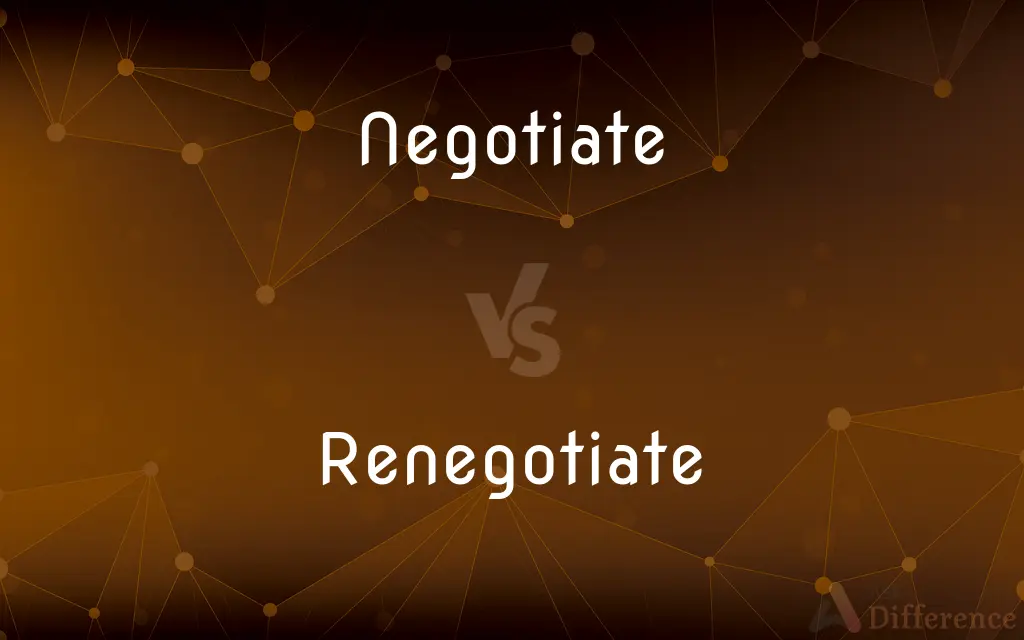Negotiate vs. Renegotiate — What's the Difference?
By Tayyaba Rehman & Maham Liaqat — Updated on April 5, 2024
Negotiating involves discussing terms to reach an agreement, while renegotiating is the process of revising an already existing agreement.

Difference Between Negotiate and Renegotiate
Table of Contents
ADVERTISEMENT
Key Differences
Negotiation is the initial process where two or more parties come together to discuss and agree on terms, such as price, conditions, or the scope of work. It's a foundational step in forming agreements, contracts, or resolving disputes, where the parties involved attempt to reach a mutually beneficial outcome. Renegotiation, on the other hand, occurs after an agreement has been established. It involves revisiting the terms of this existing agreement to make adjustments or address issues that have arisen since the original deal was made. This might be necessary due to changes in circumstances, dissatisfaction with the current terms, or the desire for improvement.
Negotiating sets the stage for how relationships, be it in business, diplomacy, or personal interactions, will proceed. It's about crafting the initial set of rules, prices, or guidelines under which parties will operate. Renegotiating, however, is about altering the course of an ongoing relationship. It reflects the dynamic nature of relationships and agreements, acknowledging that changes in the external environment, business conditions, or participants' needs can make the original terms less suitable or fair over time.
While negotiation often requires parties to start from scratch to establish common ground, renegotiation usually has a baseline—the original agreement. This can make renegotiations either more straightforward, as the parties are already familiar with each other and there's an existing framework to adjust, or more complex, due to previous commitments and expectations. The process of renegotiating might also involve re-evaluating the relationship's value, assessing new information, or leveraging changes in bargaining power.
The necessity to renegotiate can stem from various factors, including economic changes, technological advancements, or shifts in legal or regulatory environments. These external pressures can compel parties to return to the negotiating table to ensure the continued viability and fairness of their agreement. Whereas initial negotiations might be driven by the parties' desires to establish a relationship or conclude a deal, renegotiations are often motivated by the need to maintain or enhance that relationship under changed circumstances.
Negotiation and renegotiation, while distinct, are both critical components of the lifecycle of agreements and relationships. Initial negotiations lay the foundation, while the ability and willingness to renegotiate as needed can be key to the longevity and success of an agreement, adapting to new challenges and opportunities as they arise.
ADVERTISEMENT
Comparison Chart
Purpose
To establish the initial terms of an agreement.
To revise the terms of an existing agreement.
Timing
Occurs before an agreement is in place.
Occurs after an agreement has been established.
Motivation
Driven by the desire to form a new agreement.
Driven by the need to update or improve an existing agreement.
Starting Point
No pre-existing terms; starting from scratch.
An existing agreement serves as the baseline.
Complexity
Depends on the parties’ objectives and what's at stake.
Can be influenced by past commitments and the need to maintain relationships.
Factors Influencing
Future expectations, initial positions of parties.
Changes in circumstances, dissatisfaction, external pressures.
Compare with Definitions
Negotiate
Resolving disputes.
The mediator helped the parties negotiate a settlement to their dispute.
Renegotiate
Updating agreements.
The company renegotiated its supplier contracts to adjust to the new market conditions.
Negotiate
To discuss terms.
They negotiated the contract over several weeks, finally agreeing on the price and delivery schedule.
Renegotiate
Adapting to changes.
After the merger, they renegotiated their previous agreements to reflect the new corporate structure.
Negotiate
Setting conditions.
They negotiated the terms of the partnership, including roles and responsibilities.
Renegotiate
Addressing issues.
The team renegotiated the project timeline after unexpected delays.
Negotiate
Bargaining.
He negotiated a significant discount on the bulk purchase.
Renegotiate
Revising terms.
Due to the economic downturn, they had to renegotiate the loan's interest rates.
Negotiate
Reaching an agreement.
The two countries negotiated a new trade deal after months of discussions.
Renegotiate
Seeking improvements.
She renegotiated her employment contract for a higher salary and better benefits.
Negotiate
Obtain or bring about by discussion
He negotiated a new contract with the sellers
Renegotiate
Negotiate (something) again in order to change the original agreed terms
The parties will renegotiate the price
Negotiate
Find a way over or through (an obstacle or difficult route)
She cautiously negotiated the hairpin bend
Renegotiate
To negotiate anew.
Negotiate
Transfer (a cheque, bill, or other document) to the legal ownership of another person, who thus becomes entitled to any benefit.
Renegotiate
To revise the terms of (a contract) so as to limit or regain excess profits gained by the contractor.
Negotiate
To confer with another or others in order to come to terms or reach an agreement
"It is difficult to negotiate where neither will trust" (Samuel Johnson).
Renegotiate
To negotiate new terms to replace old ones.
Negotiate
To arrange or settle by discussion and mutual agreement
Negotiate a contract.
Renegotiate
Negociate anew;
The two warring parties will have to renegociate
Negotiate
To transfer (an instrument, such as a promissory note) to another party by means of endorsement.
Renegotiate
Revise the terms of in order to limit or regain excess profits gained by the contractor;
We renegociated our old mortgage now that the interest rates have come down
Negotiate
To succeed in going over or through
Negotiate a sharp curve.
Negotiate
To succeed in accomplishing or managing
Negotiate a difficult musical passage.
Negotiate
(intransitive) To confer with others in order to come to terms or reach an agreement.
Negotiate
(transitive) To arrange or settle something by mutual agreement.
We negotiated the contract to everyone's satisfaction.
The client and server computers must first negotiate a network protocol to be used.
Negotiate
(transitive) To succeed in coping with, or getting over something.
We negotiated the mountain track with difficulty.
Although the car was quite rickety, he could negotiate the curves very well.
Negotiate
(transitive) To transfer to another person with all the rights of the original holder; to pass, as a bill.
Negotiate
(obsolete) To transact business; to carry on trade.
Negotiate
(obsolete) To intrigue; to scheme.
Negotiate
To transact business; to carry on trade.
Negotiate
To treat with another respecting purchase and sale or some business affair; to bargain or trade; as, to negotiate with a man for the purchase of goods or a farm.
Negotiate
To hold intercourse respecting a treaty, league, convention, or other proposed agreement; to treat with, respecting peace or commerce; to conduct communications or conferences.
He that negotiates between God and manIs God's ambassador.
Negotiate
To intrigue; to scheme.
Negotiate
To carry on negotiations concerning; to procure or arrange for by negotiation; as, to negotiate peace, or an exchange.
Constantinople had negotiated in the isles of the Archipelago . . . the most indispensable supplies.
Negotiate
To transfer for a valuable consideration under rules of commercial law; to sell; to pass.
The notes were not negotiated to them in the usual course of business or trade.
Negotiate
Discuss the terms of an arrangement;
They negotiated the sale of the house
Common Curiosities
Can renegotiation lead to better outcomes?
Yes, it can result in terms that are more favorable or suitable given new information or conditions.
How does renegotiation differ from negotiation?
Renegotiation involves modifying an existing agreement, while negotiation is about creating a new agreement.
Is renegotiation common in business contracts?
Yes, it's common as it allows businesses to adapt agreements to changing conditions or insights.
What skills are important for both negotiating and renegotiating?
Effective communication, problem-solving, and the ability to understand and articulate the needs and constraints of all parties involved.
Why is flexibility important in renegotiation?
Flexibility allows parties to adapt to new realities and find solutions that maintain or enhance the value of the agreement.
How can renegotiation affect a business relationship?
If handled well, it can strengthen relationships by demonstrating commitment to fairness and adaptability; if handled poorly, it can lead to distrust.
What triggers a renegotiation?
Changes in circumstances, dissatisfaction with existing terms, or opportunities for improvement prompt renegotiation.
Can any agreement be renegotiated?
In theory, yes, but the willingness of parties to renegotiate depends on their perception of the agreement's fairness and their relationship.
What is a common challenge in renegotiation?
Overcoming the inertia of existing terms and negotiating changes that satisfy all parties without damaging the relationship.
How should parties prepare for renegotiation?
By assessing changes since the original agreement, identifying objectives, and understanding the other party’s position and potential constraints.
Share Your Discovery

Previous Comparison
Apathetic vs. Apathy
Next Comparison
Snuff vs. CocaineAuthor Spotlight
Written by
Tayyaba RehmanTayyaba Rehman is a distinguished writer, currently serving as a primary contributor to askdifference.com. As a researcher in semantics and etymology, Tayyaba's passion for the complexity of languages and their distinctions has found a perfect home on the platform. Tayyaba delves into the intricacies of language, distinguishing between commonly confused words and phrases, thereby providing clarity for readers worldwide.
Co-written by
Maham Liaqat














































